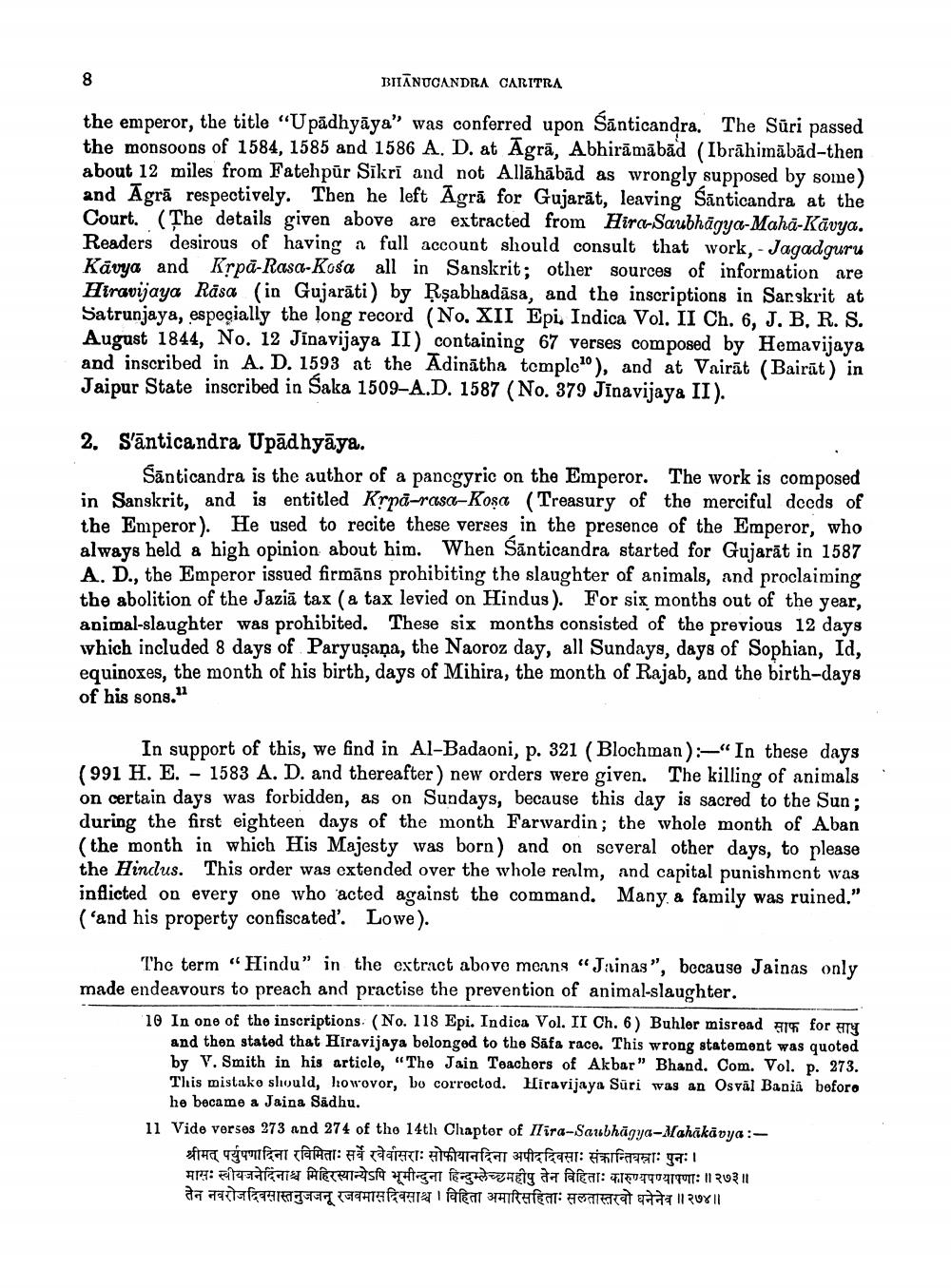________________
BIĀNUCANDRA CARITRA
the emperor, the title "Upadhyāya” was conferred upon śānticandra. The Sūri passed the monsoons of 1584, 1585 and 1586 A. D. at Āgrā, Abhirāmābād (Ibrāhimābād-then about 12 miles from Fatehpur Sikri and not Allāhābād as wrongly supposed by some) and Agrā respectively. Then he left Agrā for Gujarāt, leaving śānticandra at the Court. (The details given above are extracted from Hira-Saubhāgya-Maha-Kavya. Readers desirous of having a full account should consult that work, - Jagadguru Kävya and Krpä-Rasa-Kosa all in Sanskrit; other sources of information are Hiravijaya Rasa (in Gujarāti) by Rşabhadāsa, and the inscriptions in Sanskrit at Satrunjaya, especially the long record (No. XII Epi. Indica Vol. II Ch. 6, J. B. R. S. August 1844, No. 12 Jinavijaya II) containing 67 verses composed by Hemavijaya and inscribed in A. D. 1593 at the Adinātha templomo), and at Vairāt (Bairāt) in Jaipur State inscribed in Saka 1509-A.D. 1587 (No. 379 Jinavijaya II).
2. S'anticandra Upādhyāya.
Sānticandra is the author of a panegyric on the Emperor. The work is composed in Sanskrit, and is entitled Krpa-rasa-Koşa (Treasury of the merciful deeds of the Emperor). He used to recite these verses in the presence of the Emperor, who always held a high opinion about him. When Sānticandra started for Gujarät in 1587 A. D., the Emperor issued firmāns prohibiting the slaughter of animals, and proclaiming the abolition of the Jaziā tax (a tax levied on Hindus). For six months out of the year, animal-slaughter was prohibited. These six months consisted of the previous 12 days which included 8 days of Paryuşaņa, the Naoroz day, all Sundays, days of Sophian, Id, equinoxes, the month of his birth, days of Mihira, the month of Rajab, and the birth-days of his sons."
In support of this, we find in Al-Badaoni, p. 321 (Blochman) "In these days (991 H. E. - 1583 A. D. and thereafter) new orders were given. The killing of animals on certain days was forbidden, as on Sundays, because this day is sacred to the Sun; during the first eighteen days of the month Farwardin; the whole month of Aban (the month in which His Majesty was born) and on several other days, to please the Hindus. This order was extended over the whole realm, and capital punishment was inflicted on every one who 'acted against the command. Many a family was ruined." ('and his property confiscated'. Lowe).
The term “Hindu” in the extract above means “Jainas”, because Jainas only made endeavours to preach and practise the prevention of animal-slaughter.
10 In one of the inscriptions. (No. 118 Epi. Indica Vol. II Ch. 6) Buhler misread 1% for HT
and then stated that Hira vijaya belonged to the Sáfa race. This wrong statement was quoted by V. Smith in his article, "The Jain Teachers of Akbar" Bhand. Com. Vol. p. 273. This mistako should, howovor, bo corroctod. Hiravijaya Suri was an Osval Bania beforo
he became a Jaina Sadhu. 11 Vide verses 273 and 274 of the 14th Chapter of Ilira-Saubhāgya-Mahäkävya :
श्रीमत् पर्युपणादिना रविमिताः सर्वे रवेर्वासराः सोफीयानदिना अपीददिवसाः संक्रान्तिवस्राः पुनः । मासः स्वीयजनेदिनाश्च मिहिरस्यान्येऽपि भूमीन्दुना हिन्दुम्लेच्छमहीपु तेन विहिताः कारुण्यपण्यापणाः॥२७३।। तेन नवरोजदिवसास्तनुजजनू रजवमास दिवसाश्च । विहिता अमारिसहिताः सलतास्तरवो घनेनेव ॥२७४।




